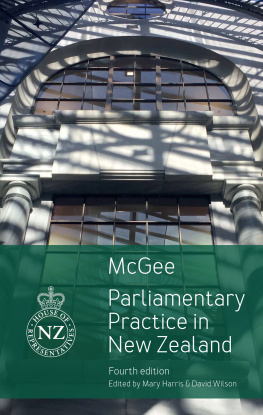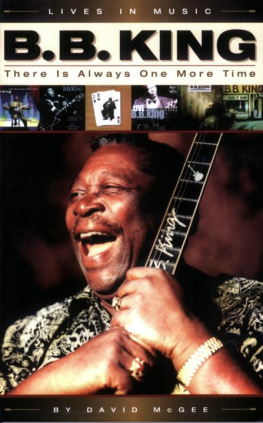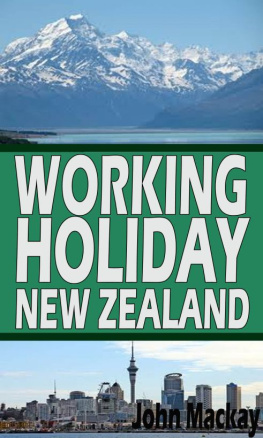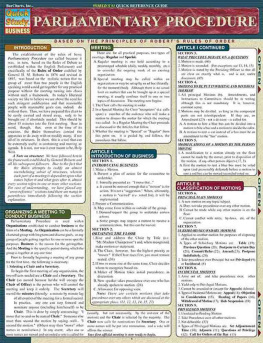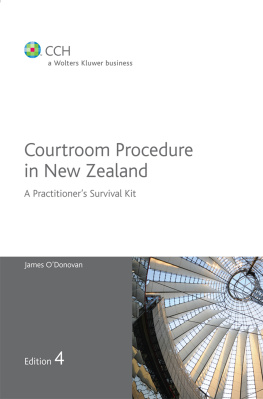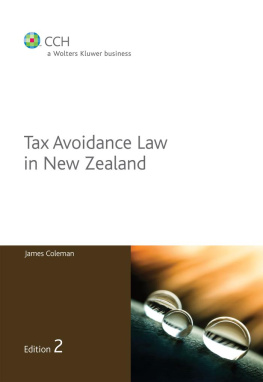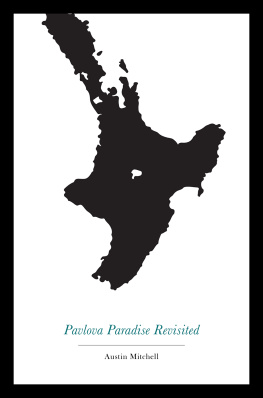David McGee - Parliamentary Practice in New Zealand
Here you can read online David McGee - Parliamentary Practice in New Zealand full text of the book (entire story) in english for free. Download pdf and epub, get meaning, cover and reviews about this ebook. year: 2017, publisher: Oratia Books, genre: Politics. Description of the work, (preface) as well as reviews are available. Best literature library LitArk.com created for fans of good reading and offers a wide selection of genres:
Romance novel
Science fiction
Adventure
Detective
Science
History
Home and family
Prose
Art
Politics
Computer
Non-fiction
Religion
Business
Children
Humor
Choose a favorite category and find really read worthwhile books. Enjoy immersion in the world of imagination, feel the emotions of the characters or learn something new for yourself, make an fascinating discovery.
- Book:Parliamentary Practice in New Zealand
- Author:
- Publisher:Oratia Books
- Genre:
- Year:2017
- Rating:4 / 5
- Favourites:Add to favourites
- Your mark:
- 80
- 1
- 2
- 3
- 4
- 5
Parliamentary Practice in New Zealand: summary, description and annotation
We offer to read an annotation, description, summary or preface (depends on what the author of the book "Parliamentary Practice in New Zealand" wrote himself). If you haven't found the necessary information about the book — write in the comments, we will try to find it.
Parliamentary Practice in New Zealand is the definitive work on practice and procedure in the New Zealand House of Representatives.
Parliamentary Practice in New Zealand — read online for free the complete book (whole text) full work
Below is the text of the book, divided by pages. System saving the place of the last page read, allows you to conveniently read the book "Parliamentary Practice in New Zealand" online for free, without having to search again every time where you left off. Put a bookmark, and you can go to the page where you finished reading at any time.
Font size:
Interval:
Bookmark:

Published by Oratia Books, Oratia Media Ltd,
783 West Coast Road, Oratia, Auckland 0604, New Zealand
(www.oratia.co.nz).
Copyright 2017 Clerk of the House of Representatives
The copyright holder asserts its moral rights in the work.
This book is copyright. Except for the purposes of fair reviewing, no part of this publication may be reproduced or transmitted in any form or by any means, whether electronic, digital or mechanical, including photocopying, recording, any digital or computerised format, or any information storage and retrieval system, including by any means via the Internet, without permission in writing from the publisher. Infringers of copyright render themselves liable to prosecution.
ISBN 978-0-947506-24-7
Ebook ISBN 978-0-947506-27-8
First published 1985 by the Government Printer, Wellington
Second edition 1994 by GP Publications, Wellington
Third edition 2005 by Dunmore Publishing, Wellington
Cover image by Gabor Hellyer
Printed in China
Contents
The fourth edition of Parliamentary Practice in New Zealand is the first to be written by a group of people, rather than an individual. It incorporates 10 years of developments in New Zealand parliamentary practice, and the second decade under the mixed member proportional (MMP) electoral system. As MMP parliaments have become more established, so practice has evolved to reflect a proportional multi-party parliament.
This edition reflects important recent developments in New Zealand parliamentary practice. One of the most significant developments has been the passage of the Parliamentary Privilege Act 2014, which set out in one statute the basis for, and extent of, parliamentary privilege. While the House will always decide how to exercise privilege and the courts will determine its applicability, the Act brings clarity to an area that had grown increasingly subject to widely different interpretations. The chapters on privilege in this book reflect the provisions of the Act, which has yet to be tested in court.
As experience of MMP parliaments has grown, so the role of the Business Committee has evolved significantly. The changes to its powers and the way it works are at the heart of a well-functioning multi-party House of Representatives. The Business Committee is able to take a flexible approach to arranging House business and has become a proving ground for new procedures, such as recent changes to financial scrutiny arrangements. Following a change to Standing Orders, the committee has made much use of extended sittings to provide more hours for legislative work. This has seen a corresponding reduction in the use of urgency.
In the preface to the first edition of this book, published in 1985, the author, David McGee, stated two objectives. The first was to throw some light on the obscure subject of parliamentary practice, about which little had been written. The second was to record a part of New Zealands constitutional law and practice. His purpose was to document the procedure of the House of Representatives, not to fix it unalterably for the future, but to establish what it was as a basis for which proposals for change can be considered. Those objectives remain central to me in the publication of the fourth edition and are reflected in the approach taken to producing it. A collaboratively written fourth edition is possible only because David McGee gave copyright of the book to the Clerk of the House of Representatives on his retirement. I also acknowledge the mammoth task he undertook in first writing the book.
Mary Harris was the driving force behind this edition and much of the work on it was done during her time as Clerk of the House. However, she made an even greater contribution to the book after her retirement, by significantly editing the draft chapters. The book benefitted enormously from her wisdom and insight, acquired through many years of service to Parliament and the central role she played in establishing the proper statutory basis for parliamentary privilege and the Houses operation in the 21st century.
The role of the Clerk of the House has changed over time. There is a much greater need to balance procedural expertise with organisational leadership. It is not possible for the Clerk to continue as the sole editor or author of a book of this size and complexity. I am particularly grateful to Mary for offering to work on the book and to the Assistant Editors Pavan Sharma and David Bagnall for managing the writing, editing and publishing of the fourth edition.
I greatly appreciate Professor Philip Josephs work on the chapters on parliamentary privilege and his expert critique of other parts of the book. Parliamentary Counsel Ross Carter also critiqued the privilege chapters. Their contributions have greatly enhanced the coverage of one of the areas of significant change for the House in recent times.
Peter Lorimer, Principal Advisor at The Treasury, carried out expert peer review of the chapters on public finance, as he did for previous editions. Colleen Pilgrim and Gareth Ellis from the Office of the Auditor-General reviewed and commented on the chapters on Officers of Parliament as well as the reporting and audit chapters, and Kristina Temel from the Electoral Commission reviewed the electoral chapter.
The following current and former staff of the Office of the Clerk wrote parts of the new edition: Rafael Gonzalez-Montero, Tim Workman, Suze Jones, David Bagnall, Pavan Sharma, Gabor Hellyer, David Fraser, Charlotte Dawber-Ashley, Lesley Ferguson, James Picker, Matthew Louwrens, Kelly Harris, Fiona McLean, Elizabeth Grant, Daniel Tasker, Fay Paterson, Debra Angus, Peter Hoare, Meipara Poata, David Williams and Tracey Rayner. Their contributions were vital to the publication of the fourth edition.
My thanks to Andie Lindsay, Janet Hughes, Jenny Heine, Waiana Mulligan, Morgan Watkins, Georgia Lockie, Mary Drakeford and Joanne Emery for their work in researching, co-ordinating, editing and formatting this book.
Editing a book of this size and scope is a significant undertaking. A cut-off date for new content must always be set and, inevitably, events overtake the published word. I intend to take an iterative approach to the production of the next edition, where there will be ongoing updates to content in the wake of any significant changes in practice. That way, major developments can be documented at the time they occur, and the book can continue to be a reliable and authoritative source on parliamentary practice. Communications technology is likely to play a much greater role in keeping future editions current. It is my hope that the revision of the book can, in future, be an ongoing task rather than a major event in its own right.
My thanks to all of those who contributed to the fourth edition of Parliamentary Practice in New Zealand.
David Wilson
Clerk of the House of Representatives
March 2017
The Parliament of New Zealand met for the first time on 24 May 1854 in Auckland. At that time the Parliament was officially styled The General Assembly of New Zealand. It consisted of three bodies: the Governor, a Legislative Council and a House of Representatives. Only the House of Representatives, the elected component, has retained its unbroken membership of the Parliament under its original title, though it is now a much larger body, with 120 members, as compared with 37 in 1854. (The 51st Parliament20142017had 121 members as a result of an electoral overhang of one member.)
The Parliament of New Zealand today consists of the Sovereign in right of New Zealand and the House of Representatives. leaving Parliament a single-chamber or unicameral legislature ever since.
Next pageFont size:
Interval:
Bookmark:
Similar books «Parliamentary Practice in New Zealand»
Look at similar books to Parliamentary Practice in New Zealand. We have selected literature similar in name and meaning in the hope of providing readers with more options to find new, interesting, not yet read works.
Discussion, reviews of the book Parliamentary Practice in New Zealand and just readers' own opinions. Leave your comments, write what you think about the work, its meaning or the main characters. Specify what exactly you liked and what you didn't like, and why you think so.

